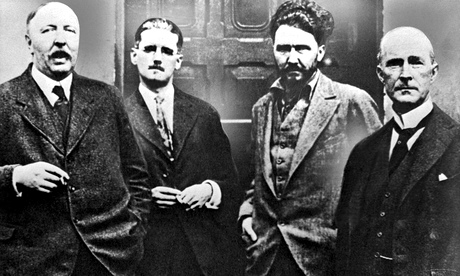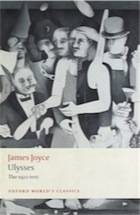This portrait of a day in the lives of three Dubliners remains a towering work, in its word play surpassing even Shakespeare

James Joyce (second left) with, left to right, Ford Madox Ford, Ezra Pound and John Quinn in Paris in 1923. Quinn was a lawyer who defended the publication of Ulysses in the Little Review. Photograph: CSU Archv/Everett / Rex Features
1922 is one of those extraordinary years in the history of English literature – the moment when Modernism came of age, and after which nothing would ever be the same again. TS Eliot's The Waste Land appeared, first in magazine and then in volume form towards the end of the year. By then, James Joyce had already seen Ulysses, a text of approximately 265,000 words, privately published in Paris by Sylvia Beach, the philanthropic proprietor of the bookshop Shakespeare & Company, after a tortuous gestation in which his novel had been prosecuted for obscenity, and almost hounded into oblivion.
 Joyce, however, was creatively obdurate. Earlier, in his autobiographical novel, A Portrait of the Artist as a Young Man, he had made an unforgettable declaration of artistic intent. His answer to the challenge of the 20th century was to declare independence. He wrote: "I will not serve that in which I no longer believe, whether it call itself my home, my fatherland, or my church: and I will try to express myself in some mode of life or art as freely as I can and as wholly as I can, using for my defence the only arms I allow myself to use – silence, exile and cunning."
Joyce, however, was creatively obdurate. Earlier, in his autobiographical novel, A Portrait of the Artist as a Young Man, he had made an unforgettable declaration of artistic intent. His answer to the challenge of the 20th century was to declare independence. He wrote: "I will not serve that in which I no longer believe, whether it call itself my home, my fatherland, or my church: and I will try to express myself in some mode of life or art as freely as I can and as wholly as I can, using for my defence the only arms I allow myself to use – silence, exile and cunning."
Today, novelists writing a hundred years after the composition of Ulysses still write in the shadow of this extraordinary achievement. Occasionally, it is said that English-language fiction since 1922 has been a series of footnotes to Joyce's masterpiece.
More
 Joyce, however, was creatively obdurate. Earlier, in his autobiographical novel, A Portrait of the Artist as a Young Man, he had made an unforgettable declaration of artistic intent. His answer to the challenge of the 20th century was to declare independence. He wrote: "I will not serve that in which I no longer believe, whether it call itself my home, my fatherland, or my church: and I will try to express myself in some mode of life or art as freely as I can and as wholly as I can, using for my defence the only arms I allow myself to use – silence, exile and cunning."
Joyce, however, was creatively obdurate. Earlier, in his autobiographical novel, A Portrait of the Artist as a Young Man, he had made an unforgettable declaration of artistic intent. His answer to the challenge of the 20th century was to declare independence. He wrote: "I will not serve that in which I no longer believe, whether it call itself my home, my fatherland, or my church: and I will try to express myself in some mode of life or art as freely as I can and as wholly as I can, using for my defence the only arms I allow myself to use – silence, exile and cunning."Today, novelists writing a hundred years after the composition of Ulysses still write in the shadow of this extraordinary achievement. Occasionally, it is said that English-language fiction since 1922 has been a series of footnotes to Joyce's masterpiece.
More

No comments:
Post a Comment